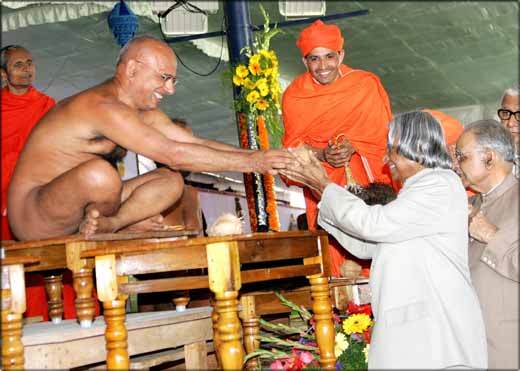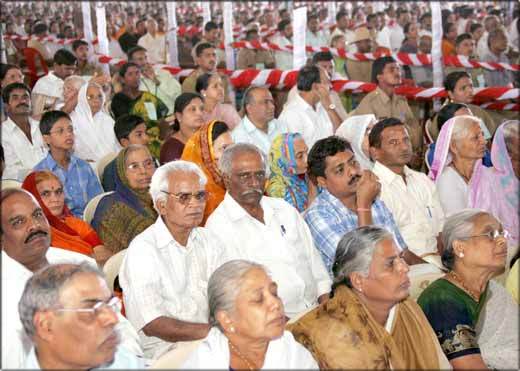Address At The Inauguration Of The Mahamastakabhisheka Of Bahubali At Shravanabelagola, Hassan, Karnataka
Warrior of Non-Violence
I am happy to be here today to inaugurate the Gommateshwar Bhagawan Sri Bahubali Mahamastakabhisheka Mahotsava - 2006. My greetings to His Holiness Shanti Sagar Muni Maharaj, His Holiness Charu Keerti Bhattaraka Swamiji, His Holiness Acharya Shree Vidhya-nandhaji Maharaj, Dr. Veerendra Heggade, Dharmadhikari of Sri Kshetra, Dharmasthala, distinguished guests and other participants. I consider myself privileged to inaugurate this auspicious function which is held once in 12 years and is the first of its kind in the 21st century.
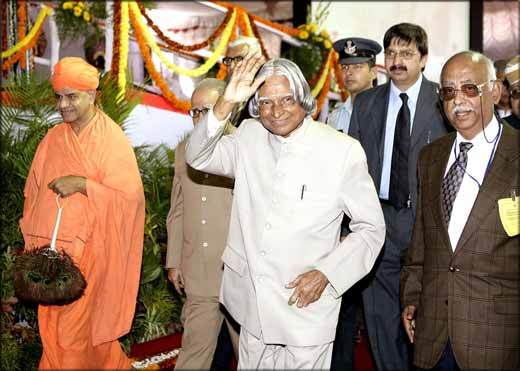
When I am in front of Gommateshwara, let me recite a celebrated poem written by a devotee as "A strain of sanctity". The poem reads:
A strain of sanctity
You stand sky high, un-clad in mind and body,
Bahubali! A warrior of non-violence.
You wrought your mind in sobriety; the damsel
Of detachedness enamoured you: your soul bloomed.
This poem celebrates a warrior of non-violence.
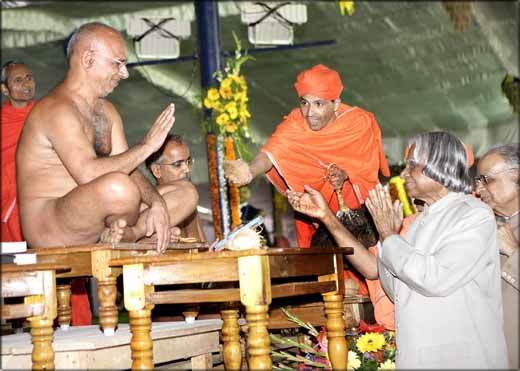
When I am in Shravanabelagola, let me recall how I came into the spiritual contact of Jain Dharma. In 2003, I visited Pavapuri in Bihar. There was a beautiful temple of white marble in the midst of a placid lake. Lord Mahavira walked on this sacred land. I was studying Mahavira?s life and I found that Mahavira spent seven days preaching to all the rulers of the world when he felt that he was to leave this world soon. All the rulers learnt the beliefs of Jainism particularly protecting the lives of all living beings including animals and plants. Mahavira was a great teacher and he taught that before becoming free, a person has to pass through four stages namely Sadhu (Ascetics), Upakhyaya (Teachers), Acharya (Heads of Orders) and Arhat (Freed Soul, which are still attached to mortal condition). What a beautiful ascent of human soul!
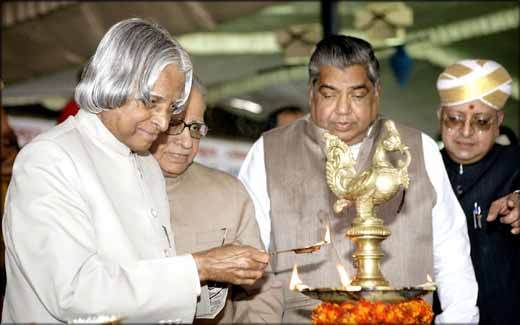
I undertook the traditional parikrama of the temple while chants of religious slokas rent the air. During the Parikrama, I saw lotus flowers around me blooming in the sprawling Lake. When my mind was engulfed in beauty of the flowers, I remembered a couplet written by a famous Tamil poet Tiruvalluvar 2000 years ago, which gives the axiom of life.
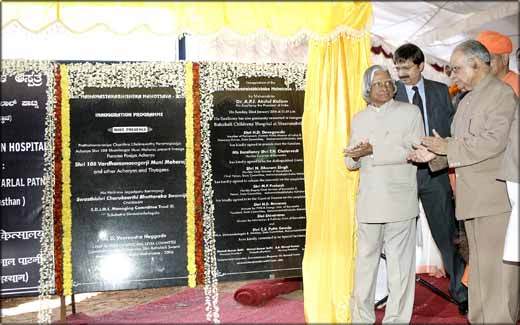

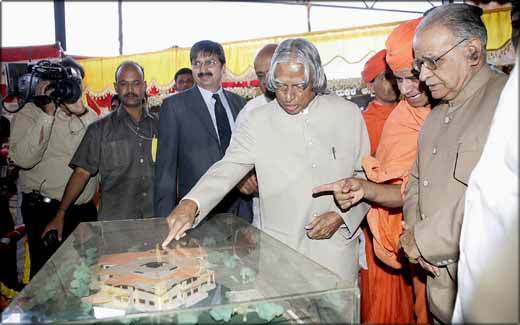
It means: whatever be the depth or the state of cleanliness of the pond, the lotus flower springs out and blooms majestically looking towards the sun. Similarly the human living can be transformed into a purposeful high living, whatever the circumstances may be, only when a great aim engulfs the mind of the individual.
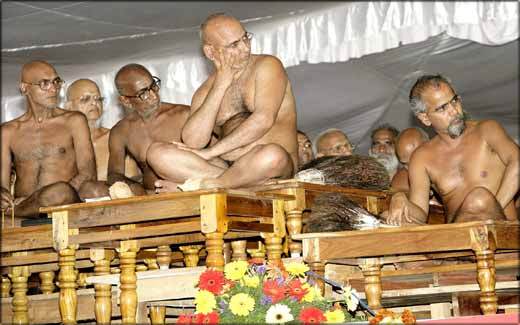
Now, when I am at Shravanabelagola standing in front of the majestic Gommateshwara statue built by Chavundaraya in 981 AD, the serenity and peace radiating in the face of the Gommateshwara inspires me. The sculptor Aristenemi carved out the beauty and harmony hidden in the huge rock by the skill of his hands, so creatively.
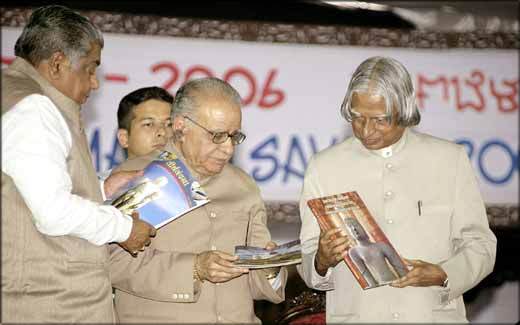
Jainism has flourished in Karnataka for over 2000 years as a vital and powerful force. In the 3rd century BC the Mauryan Emperor Chandragupta came here with twelve thousand other Jain sages, and settled down in Shravanabelagola, performing austerities. The large congregation of the devotees today indeed symbolizes the continuity of a great tradition.
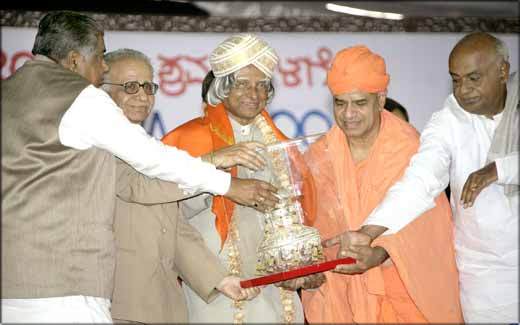
Jainism has had a great influence on the people. The contribution of Jains to the Indian philosophy, thought, literature and science is noteworthy. The great poet Pampa, Ranna, Ratnakara Varni and many others have enriched Kannada literature. Jain rulers also contributed immensely in the architecture. With its ever lasting smile and benign looks Gommateshwara Bahubali declares Ahimsa and Vairagya as the solution for all the ills of this world. I am happy that Mahamastakaabhisheka has become an auspicious festival, not only for the Jains but also for people from different religions. This is a great unifier. I wish that this message of unification is taken and all the sects in every religion forget the differentiation and follow the twin principles of Ahimsa and Vairagya.
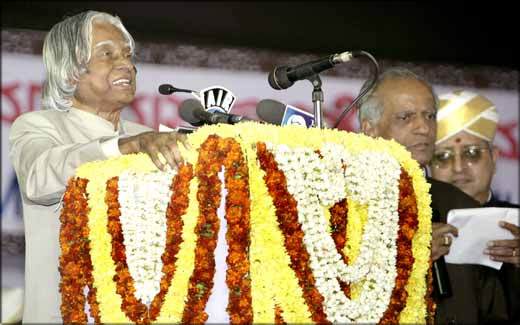
Conclusion
I understand that the celebration of Mahamastakabhisheka has led to the creation of five satellite towns in and around Shravanabelagola. All the activities towards the Abhishekam has been supported by State Government, Central Government, political leaders, religious leaders and people from all walks of life. This spirit of cooperation for a common cultural endeavour should percolate in all our nation building activities.
This five satellite towns can have a physical connectivity, electronic connectivity, knowledge connectivity leading to economic connectivity of the cluster of villages around the satellite towns. Economic development under the divine blessings of towering Gommateshwara, will become an example of how living conditions can be improved through the provision of urban facilities in rural areas. I have one suggestion: to establish a research centre where the work of best of great saints of Jainism is synthesized. This would enable the propagation of the value system adopted by the great tradition of Jainism in the affairs of the contemporary world.
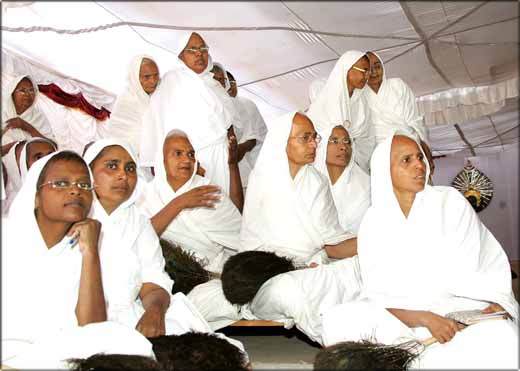
It is a beautiful sight of people of multiple faith and affiliations gathered to celebrate a great cultural event. The most sacred meaning of life consists of helping the establishment of the peace and harmony on the earth. This can only be achieved through the practice of Truth, Ahimsa and Vairagya by all of us. The stone sculpture of Bahubali symbolizes renunciation, self-control and subjugation of ego as the first step towards salvation. The digambara form of Bahubali represents the complete victory over earthly desires and needs that hamper spiritual ascent towards divinity. Let this message travel to all parts of the country and bring forward peace and harmony among all the citizens of the nation.
With these words, I inaugurate the Gommateshwar Bhagawan Sri Bahubali Mahamastakabhisheka Mahotsava.
May God bless you all.
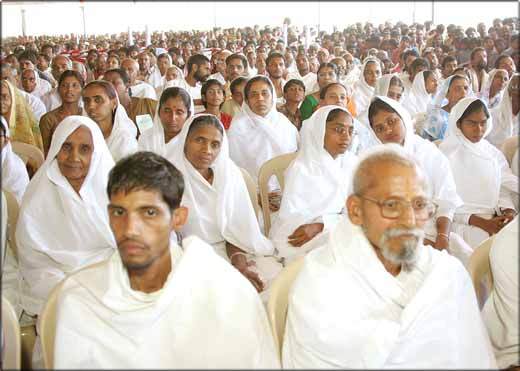
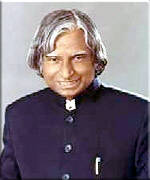 Dr. A.P.J. Abdul Kalam
Dr. A.P.J. Abdul Kalam
